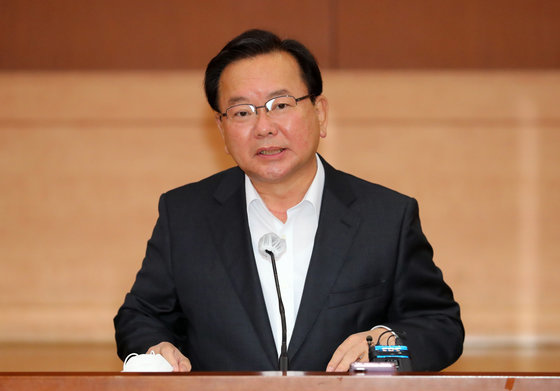PM implies return to normal may stop if we fail in this crisis
PM implies return to normal may stop if we fail in this crisis
Posted November. 20, 2021 07:42,
Updated November. 20, 2021 07:42

“There is growing concern that we may have to stop the journey back to normal that has just made a rocky start if we allow the ongoing crisis to beat us up,” said South Korean Prime Minister Kim Boo-kyum in an emergency meeting with heads of high-grade medical centers in Seoul and its neighboring areas on Friday, emphasizing that the nation is faced with a serious crisis. The meeting was arranged to help find ways to better respond to the recent spike in the number of serious and critical COVID-19 patients.
Prime Minister Kim commended public health providers for their dedications and efforts made all the way since the onset of the fight against COVID-19, highlighting that they have been under greater pressure than ever to make sacrifice since the nation started a phased return to pre-pandemic life. Following the meeting, the administration published measures to strengthen the medical response system, under which hospital beds will be operated in an integrated way between the Seoul metropolitan area and the rest of the country while visitors are prohibited from entering psychiatric hospitals, senior care hospitals and equivalent facilities, which have recently been at the center of post-vaccination breakthrough infection.
There are still dark clouds forming around the COVID-19 pandemic and the medical response system. As of midnight on Friday, the daily number of newly confirmed cases reached 3,034 – exceeding the 3,000 threshold for three days running. As many as 499 patients were reported to be in critical condition. An average of 23 people died of the coronavirus over the recent one week, up from an average of 16 during the week earlier. All of such stresses only stretch capacity of the medical system across the Seoul metropolitan area.
In Seoul, the operating rate of hospital beds exclusive to severe and critical patients stayed in the 80 percent range for three consecutive days including Friday with a rate of 80.3 percent. Added to this, Gyeonggi Province (76 percent) and Incheon (75.9 percent) recorded a higher rate than 75 percent – from which an emergency plan is supposed to be reviewed as per the nation’s quarantine guidelines. The number of those waiting for available beds over a day recorded 520 on Friday, 97 up from the previous day.
As many as six patients have been reported to die since this month as it took so long to be assigned a hospital bed. Lee Ki-il, the division chief at the Central Disaster and Safety Countermeasures Headquarters, said that there are no deterrence factors in reducing the number of patients at play, expecting it to grow further. “The three weeks ahead will be the hardest yet,” he said.
noel@donga.com · ksy@donga.com




![[단독]다주택자 대출연장 규제, 서울 아파트로 제한 검토](https://dimg.donga.com/c/138/175/90/1/wps/NEWS/IMAGE/2026/02/20/133392750.1.jpg)


